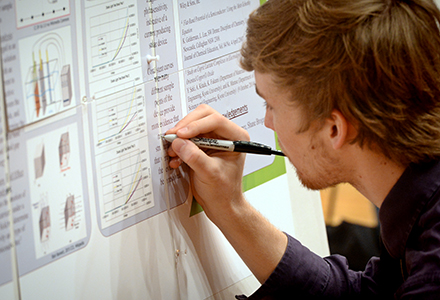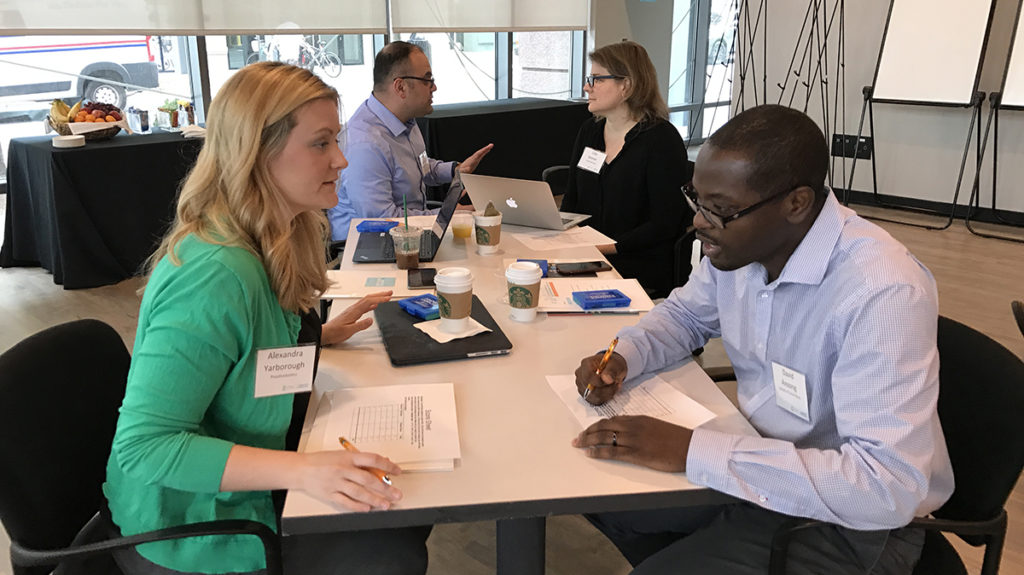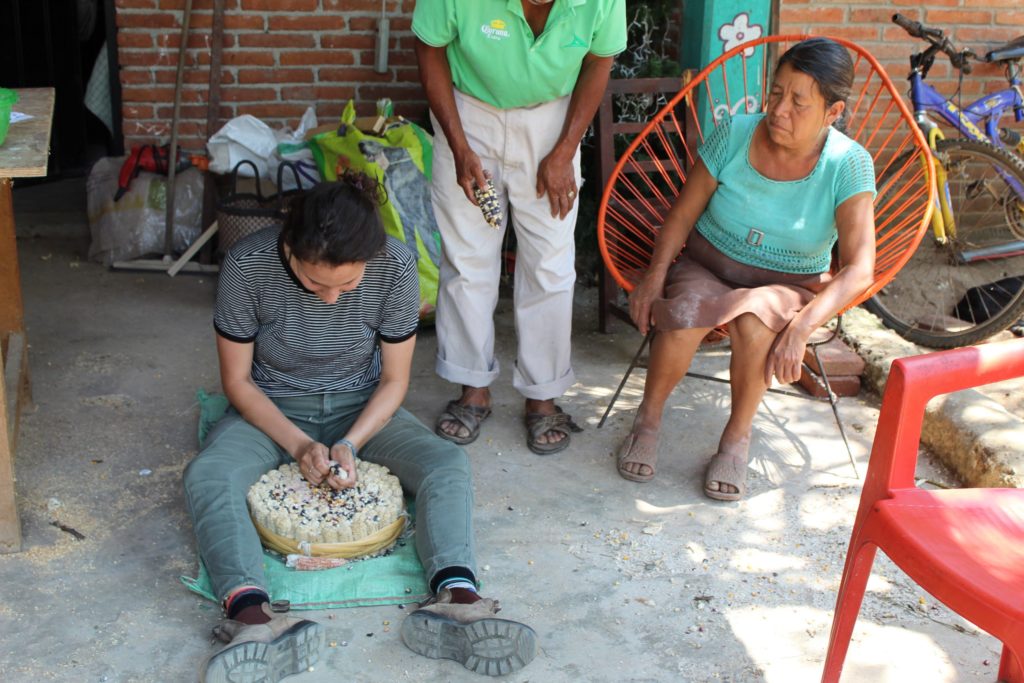
(Photo by Jon Gardiner)
Sherry Salyer had no clue what she was getting herself into when she first came to Carolina 25 years ago.
But she knew it was a risk taking a job as a lecturer – on a one-year contract – in the Department of Exercise and Sport Science and leaving her old job as a middle school health and physical education teacher in the Winston-Salem/Forsyth County Schools – the one and only job she had held for the past 17 years.
She had graduated summa cum laude from Appalachian State University with a bachelor’s degree in health and physical education and amassed a successful record as a teacher and coach. Still – because she lacked a doctorate – she wondered if her new colleagues would consider her unqualified.
She also had no idea what college students would be like – or if she would like them. All her years of teaching had been with middle school students. “We used to joke and say to teach middle school you had to be a little off, to be a little quirky to put up with the quirkiness in the kids,” Salyer said. “But I loved that quirkiness in them. I wasn’t sure if I would like the kids here and be able to relate to them. What would they be like?”
A model of caring and service
She began to erase those doubts soon after she joined the department in 1992, and in 1997, she was named director of undergraduate students in the department. Salyer became a senior lecturer in 2006, then a master lecturer in 2012. Since 2014, she has been teaching professor.
Her courses have included Fundamentals of Exercise and Sport Science, Personal Health and Principles of Coaching. Year after year, students regularly rate her “excellent” on course evaluations. She was a seven-time finalist for the department’s Excellence in Undergraduate Teaching Award, winning it in 2001 and 2007.
That difference between middle school students and college kids she had worried about, Salyer said, turned out to be not so big after all. “They are a lot like the middle school kids. Don’t tell them. They want your love and attention, and most of the time, but not always, they do the work.”
Her connection with college students deepened still further in 1997 when she took on the additional role as an adviser in the Academic Advising Program in Steele Building. That experience, she said, “gave me a perspective not available to many faculty and informed how I interacted with students.”
She valued it enough to keep doing it for 16 years. And since 2007, she has been a mentor with the Carolina Covenant Program. She counts those two experiences among the most rewarding – and irreplaceable – things she has ever done while working at Carolina.
The ultimate affirmation of respect from her colleagues arrived this spring in the form of a 2017 C. Knox Massey Distinguished Service Award. Colleagues who nominated her emphasized the profound impact she has had on her students – and on them.
Kevin Guskiewicz, the dean of the College of Arts and Sciences and longtime chair of the Department of Exercise and Sport Science, said students often refer to Salyer in a very positive way as their “mother away from home.”
Anthony Hackney, a professor in the department, said Carolina is a better place because of Salyer’s presence. One reason is that she helps students to become better people.
“She doesn’t just help these young people to be smarter, but also to be more thoughtful and prepared to shape the world – not just be in the world,” Hackney said.
An appreciation of history
The world her students are about to enter is far different from Salyer’s. One big change is the 1972 enactment of Title IX, the federal law that outlawed gender discrimination in all publicly supported educational programs. The law opened a door for women that had previously been closed to them. At Appalachian State, Salyer played on the university’s field hockey and tennis teams.
Growing opportunities for women in sports have coincided with the expanding number of career paths available to students who major in exercise and sport science, including athletic trainers, exercise physiologists, occupational therapists and orthopedic surgeons.
The exercise and sport science major now ranks in the top five undergraduate majors within the College of Arts and Sciences, Salyer said. The first year Salyer was there, the department had its graduation ceremony for about 40 students in Fetzer 109, a large auditorium-style classroom with more than 125 seats. This year, with 270 graduates, “we held it in the Smith Center,” Salyer said.
Salyer’s keen sense of history – and play – is on full display in an office that looks more like a museum or a scene captured in a Norman Rockwell painting. Sports memorabilia fills the space, from wooden dumbbells and tennis rackets to a vintage wooden Duncan Butterfly Yo-Yo like the one she had as a girl.
There’s also a framed photograph of a high school basketball team circa 1920. The tall boy at the end of the back row – whose red hair is impossible to detect from the black-and-white image – is her beloved grandfather.
After her parents divorced, Salyer and her mother went to live with her grandfather and grandmother, whose love and support gave her an idyllic childhood in the fledging suburbs of Charlotte.
Fighting time – and Dickinson
Salyer points to a wall of diplomas that her grandmother paid to have framed when Salyer moved into the office in fall of 1992. They now include her original degree from Appalachian, a bachelor of arts in English and a doctorate in exercise and sports medicine, both from the University of North Carolina at Greensboro. The doctorate took her seven years to earn.
In all the years she has worked at Carolina, Salyer said she never worried that her contract would get renewed. But at 65, and with nearly 43 years of state service, her colleagues now worry about when she will choose to retire.
At a faculty meeting several years ago, she playfully announced her plans. “I am going to retire,” she declared, pausing for dramatic effect and holding up The Complete Poems of Emily Dickinson, “when I finish reading this book.”
The tome contains 1,750 poems. Salyer sometimes jokes she hates Dickinson, but what she really means is that Dickinson’s work is challenging enough to take lots of time to fully grasp. “I knew it would take a long time” Salyer said. “If I read one poem a day, then I could retire in four years, seven months!”
This story is one of a series featuring 2017 winners of the C. Knox Massey Distinguished Service Award by the University Gazette. The late C. Knox Massey of Durham created the awards in 1980 to recognize “unusual, meritorious or superior contributions” by University employees. The award is supported by the Massey-Weatherspoon Fund created by three generations of Massey and Weatherspoon families. Each recipient receives a $10,000 stipend.
By Susan Hudson, University Gazette



